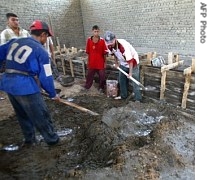2007年VOA标准英语-US Officials: Iraq Reconstruction Beset With Pr(在线收听)
Washington
22 March 2007
U.S. officials say the reconstruction of Iraq is moving forward and improving despite severe problems that have hampered many projects since Saddam Hussein was removed from power in 2003. VOA's Michael Bowman reports from Washington, where top civilian and military officials overseeing Iraq's reconstruction testified on Capitol Hill hours after the release of a Pentagon report detailing shortcomings in the rebuilding effort.
 |
| Construction workers mix cement at a power station under construction in the poor eastern neighborhood of Sadr city in Baghdad, 22 Aug 2005 |
"The inspector general's report is full of discouraging examples of key facilities that suffered from poor design, sloppy construction, inadequate quality control," he explained. "One example: plumbing was so poorly installed at the Baghdad Police College that dripping sewage not only threatened the health of students and instructors, it could [also] affect the structural integrity of the building."
Levin was speaking at a hearing of the Senate Homeland Security and Governmental Affairs Committee. Among those testifying was Major General Ronald Johnson of the U.S. Army Corps of Engineers, who insisted that, despite problems, progress has been made in Iraq.
"We have completed 13 refurbished hospitals that can serve 5,500 patients a day; we have restored water treatment facilities benefiting over 2.3 million Iraqis; we have completed 800 new or renovated schools; [and] we have increased electric power generation benefiting 1.3 million homes," said Major General Johnson.
Also testifying was the author of the Pentagon report, Inspector General Stuart Bowen, who said many projects suffered from a lack of planning and coordination, leading to wasteful spending. But he said cases of fraud were rare.
His report urges a number of corrective steps ranging from better communication between U.S. governmental agencies to increased consultations with Iraqis.
"Program managers should integrate local populations at every level of planning from the outset," noted General Bowen. "It is more than just contracting with Iraqis. It is engaging the interests of the local population as much as possible in developing the program itself."
All who testified acknowledged the challenge of carrying out major reconstruction projects in a country torn apart by civil strife.
Mark Ward is an administrator with the U.S. Agency for International Development (USAID).
"There are a thousand problems in Iraq, and then there is one," he said. "And that one is security in Baghdad. And that is the essential pre-requisite to solving the rest of those problems."
David Satterfield, a senior advisor to Secretary of State Condoleezza Rice, says 2007 is a transitional period for U.S. rebuilding efforts.
"We have shifted our focus from large infrastructure projects to capacity development, technical assistance programs, that increase the capacities of Iraqis to better plan and execute their capital budget [and] manage their reconstruction projects," he explained.
U.S. officials are betting that revamped procedures for the reconstruction of Iraq coupled with enhanced security provided by the ongoing surge of U.S. forces in the country will provide a boost to rebuilding efforts.
Committee Chairman Joe Lieberman of Connecticut said he hopes the bet pays off, noting that the stakes in Iraq and Afghanistan are high.
"If we want these nations to become free and prosperous societies that will be our allies in the war on terror rather than falling back into dictatorship, [then] we must help them build the infrastructure upon which prosperity and freedom depend," said Mr. Lieberman.
In addition to the troop surge, President Bush's "new way forward" for Iraq calls for expanding the size and number of reconstruction teams, engaging local leaders and populations, promoting reconciliation among Iraqi factions and boosting economic development.
After meeting with reconstruction team leaders at the White House, President Bush hailed their efforts to, in his words, "help a young democracy survive."
The president also urged Congress to approve new funds for U.S. efforts in Iraq. Many Democratic legislators want to impose a deadline for U.S. troops to withdraw, something the administration strenuously opposes.